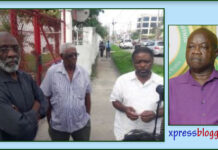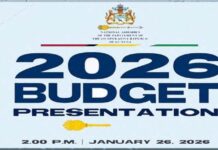In defense of history, specifically as it pertains to Guyana’s politics which remains vulnerable because the archiving of Presidential records is either a selective or inconsistent practice, we revisited some chronicles to recover some of the relevant facts of trade agreements between Guyana and Barbados to place those facts in appropriate historical context.
As governments go, there is usually continuity of action and succeeding administrations of most countries give credit to the founders of previous plans and practices, in recognition and as a record of the ideas and efforts formerly used to advance their society.
It is as much of a blow to civilization not to have orderly archiving of former governments as it is to post malignant and manufactured information as historical data in self- reporting source references like Wikipedia and Britannica, to obliterate any trace of their existence.
Social media is abuzz with the arrival of black belly sheep in Guyana and the genius is being ascribed to the current President and his Party with unbridled implication that this trading concept was birthed amongst them.
This we find to be, not only, counterfactual revisionism of Guyana’s political history but a deliberately callous sort of recall that matches and rides in tandem with the failure – by the Party that sat longest in the seat of government– to archive and to honestly share decades of governing history because of coexisting animus.
There’s nothing wrong with downplaying history but danger resides in understating it to the point of dissolution which, then, becomes straight up deception.
And collateral damage here is the loss of the robust role Guyana played in forging trade amongst its Caribbean counterparts.
It was the PNC’s ideology that forged Burnham’s stearing British Guiana to being part of the West Indies Federation – the first form of interregional trading, albeit, with British Guiana holding observer status- a non -decision making member.
The federation, created by England in 1958, had as its anthem God save the Queen , membership of islands of the Eastern Caribbean with Trinidad & Tobago being the richest, Barbados, Leeward and Winward islands all tethered to Jamaica, the 2nd richest country with the highest population and located 1 thousand miles west of Trinidad and Tobago which created insurmountable geographical difficulties, different levels of economic problems, at the time.
It was this far -flung geography of members that resulted in a combination of burdensome logistics and with different levels of economic progress, population imbalances, impossible challenges for the Federation.
In 1961, Jamaica placed preference for membership on its ballot and the electorate voted to leave. They left, prompting a typical Eric Williams aphorism…1 from 10 leaves naught. Eric withdrew Trinidad and Tobago on January 15 1962. The Federation collapsed in May 1962.
We revisited the genesis of the Federation and the other antecedents to the current black belly sheep agreement to correct, as much as we could, the erasure of a proud history that has been blotted out with the vandalism of buckets of red paint by the Party that has sat for the longest in the country’s governing seat.
Thankfully, the records of its regional participation are not all archived in Guyana and have stewards amongst those governments imbued with a better sense of civilization than racial domination.
In spite of its observer status in the West Indies Federation, it was British Guiana, under the leadership of Forbes Burnham, that was integral to the resuscitation of the idea of regional independence and the promotion of other organizations for this purpose along the way, as part of a trial and error period to improve the regional commerce and trading authority that was the vision of the founding leaders.
In an address by the Right Honorable Errol Barrow at the signing of the Treaty of Chaguaramus on July 4th 1973 to establish the Caribbean Community and Common Market, CARICOM, he detailed the work of Burnham, from their university days –
where Burnham was the first President of the West Indian Student’s Association –
to that moment and what it had done to bring the region together as an economic force and revealed too, that he and Burnham had quietly established Caribbean Free Trade Association CARFITA since the 4th of July 1965, had tested it between the two countries and was, at that moment, inviting all regional members to get on board.
There are reasons why history matters and why political records are preserved over centuries and across generations. Not the least of which is that, it informs society of what preceded its current period, the sociopolitical measures it took, what formed commerce and its evolving economic models.
Overall, it is a leg up for the political future… to paraphrase former leaders Jefferson and Thatcher.
And Forbes Burnham’s ‘Integrate or Perish’ speech in 1967 was not only timely then but prescient now.
This is why Irfaan Ali’s match up representation on the black belly sheep agreement and his ‘model of success’ promises sound like flippant recitations when compared to the depth of a Motley speech which never forgets to credit Errol Barrow’s founding efforts for regional integration in his, now, often referred to ‘Friends of all- Satellites of none” pledge .
And she doesn’t stop at the buzz words. She goes to the core of the fight for independence started by those before her in her “Barbados won’t help US divide the Region” speech.
We’re not citing all this to say that we expect more from Ali.
Look.
Ali is a blank slate in every way that label can be applied to a politician, let alone a President.
We’re just showing how intelligence and genuine academic rigor equips a person to lead and draw on history to improve the future, in Mia Motley …and why, despite the PPP’s omission of the history of Burnham’s contribution to Caribbean Independence, it surfaces every time a speech to its efforts is made by regional leaders because they, too, were taught that knowledge of history is the precondition of politcal intelligence.
We’ll also use this moment to highlight Motley’s stance “Barbados will not take part in US attempt to divide the region …” her call, in the interest of humanitarianism and democracy, for America to end its embargo against Cuba, as well as her attendance at the US Summit of Americas , where she chastised America’s political hypocrisy, as she burrowed down on her country’s and regional push for economic autonomy.
By contrast, Guyana got a photo of Irfaan attending that controversial summit with his wife —no read out of any significant statement on regional matters. None.
But then, unlike Motley, he owes a debt of existence to the plenipotentiary Madam who has rebranded his Party for America’s gain and recognizes him as the show horse for her purpose.
And his ill-fit for the nation’s highest office shows every time a matter of national history requires commentary.
That the poor dude is verbal only at the prompt of cue cards, exposing the absence of a familiarity with the history of his nation and a dexterity to think and apply knowledge of his country’s positions in real time, tells us that ignorance is not bliss – and coming from the President makes it even more damning.
We’re submitting that, for all of Mia Motley’s natural intelligence and schooled knowledge of regional history, she must have found Ali’s juvenile exuberance in declaring his black belly sheep diplomacy a model for CARICOM, depressingly amusing – the combination of his lack of knowledge and his ownership by madam plenipotentiary…placing her sentiment at polar points on that spectrum.
She must have wondered at his ‘land for youth fix it as a collective’ speech which was delivered as a platitude and not on its historic platform- having initially been done circa 1967 by Forbes Burnham. Follwing this highlight 1967, on page 2 about 10 lines down, you’ll see that the term “bread basket of the region” was Forbes’ vision and about 5 lines below that you’ll see
“Already there’s a trickle of West Indians into the Guyanese interior to establish farming communities- a movement encouraged by the country’s government for reasons which have political consequences as well as the more obvious economic benefits.”…..
in an interview done by Institutte of Current World Affairs received in New York on November 7th 1969 and signed by a Frank Mc Donald, an investigative journalist at that time .
As we said in our opening, we’re here to defend Guyana’s history… save as much of it as we could from political defacing with red paint. History never dies it seems and gains more life when smothered.
The imperialist control of Guyana’s governing arm by the resident US Ambassador is the kind of reverse engineered democracy that promotes America’s interests by supporting a government reputed for appalling actions, not limited to police brutality, police murder of black men and systemic racism, against its Afro community.
What remains at stake is our nation’s Independence and its status as a Republic – both of which are now in the hands of the other arm of government …the constitutional Opposition, to save.
From the looks of things, they are still at the start line, eight months in, yet to mount a winnable offensive.





